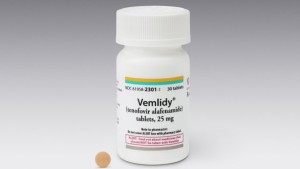FDA approves drug for adults with chronic hepatitis B virus
FOSTER CITY, California – The U.S. Food and Drug Administration (FDA) has approved Vemlidy® (tenofovir alafenamide, TAF) 25mg, a once-daily treatment for adults with chronic hepatitis B virus (HBV) infection with compensated liver disease, Gilead Sciences, Inc. (Nasdaq: GILD) announced.
Vemlidy has a boxed warning in its product label regarding the risks of lactic acidosis/severe hepatomegaly with steatosis and post-treatment severe acute exacerbation of hepatitis B. See below for important safety information.
Vemlidy is a novel, targeted prodrug of tenofovir that has demonstrated antiviral efficacy similar to and at a dose less than one-tenth that of Gilead’s Viread® (tenofovir disoproxil fumarate, TDF) 300mg. Data show that because Vemlidy has greater plasma stability and more efficiently delivers tenofovir to hepatocytes compared to Viread, it can be given at a lower dose, resulting in less tenofovir in the bloodstream. As a result, Vemlidy improved renal and bone laboratory safety parameters compared to Viread.
“Chronic hepatitis B is a life-threatening illness that affects up to 2.2 million people in the U.S.,” said Calvin Pan, MD, Clinical Professor of Medicine, NYU Langone Medical Center, and investigator in the Vemlidy clinical trials. “Clinical trials demonstrated Vemlidy is efficacious with improved renal and bone safety parameters compared to Viread, representing an important development for people living with this chronic disease.”
Vemlidy’s approval is supported by 48-week data from two international Phase 3 studies (Studies 108 and 110) among 1,298 treatment-naïve and treatment-experienced adult patients with chronic HBV infection. Study 108 randomized and treated 425 HBeAg-negative patients with either Vemlidy or Viread, and Study 110 randomized and treated 873 HBeAg-positive patients with either Vemlidy or Viread. Both studies met their primary endpoint of non-inferiority to Viread based on the percentage of patients with chronic hepatitis B with plasma HBV DNA levels below 29 IU/mL at 48 weeks of therapy.
In an integrated analysis of both studies, patients receiving Vemlidy demonstrated improvements in certain bone and renal laboratory parameters compared to those treated with Viread. Patients in the Vemlidy arm also experienced numerically higher rates of normalization of blood serum alanine aminotransferase (ALT) levels.
Vemlidy and Viread were generally well-tolerated by patients in both studies and discontinuations due to adverse events were 1% and 1.2%, respectively. The most commonly reported adverse events in both studies included headache, abdominal pain, fatigue, cough, nausea and back pain and occurred at similar rates in patients receiving either Vemlidy or Viread.
“Since the mid-1990s, Gilead has been working to improve and simplify care for people living with chronic hepatitis B,” said John Milligan, Ph.D., President and Chief Executive Officer of Gilead Sciences. “Vemlidy is the first medication approved to treat this disease in nearly a decade, and we are excited to offer a new, effective option to help advance long-term care for patients.”


